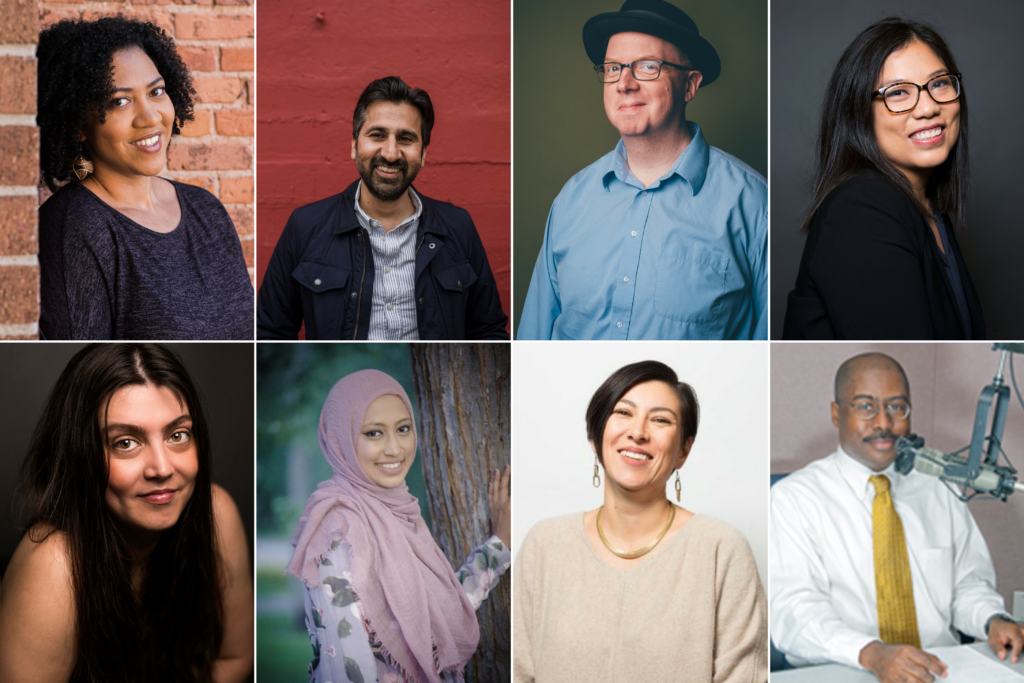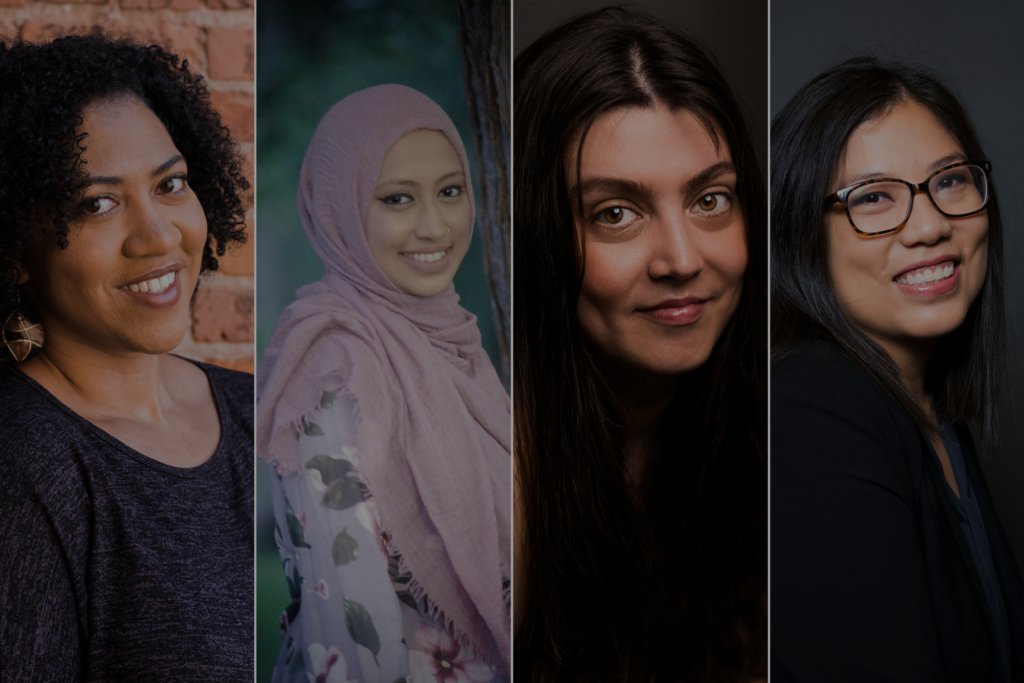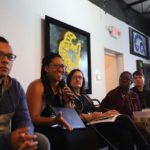 From Left to Right: (top row) Brittany Hutson (fellow), Zahir Janmohamed (mentor), Rob St. Mary (mentor), Dorothy Hernandez (fellow), (bottom row) Serena Maria Daniels (fellow), Nargis Hakim Rahman (fellow), Sara Alvarez (mentor), and Jerome Vaughn (mentor).
From Left to Right: (top row) Brittany Hutson (fellow), Zahir Janmohamed (mentor), Rob St. Mary (mentor), Dorothy Hernandez (fellow), (bottom row) Serena Maria Daniels (fellow), Nargis Hakim Rahman (fellow), Sara Alvarez (mentor), and Jerome Vaughn (mentor).
Reporters to focus on Detroit food stories under a fellowship for immigrant journalists and journalists of color.
WDET, Detroit’s Public Radio Station and Feet in 2 Worlds, an award-winning website and journalism training project, have teamed up to offer food journalism fellowships to four immigrant journalists and journalists of color in Metro Detroit. The fellowship reflects a shared commitment by the two organizations to bring greater diversity to WDET’s newsroom and to support the voices of emerging local journalists in shaping important narratives about Detroit.
“This is a unique opportunity for journalists to learn new skills while covering stories about critical issues in food including food culture in immigrant communities, child nutrition and education, labor and employment, anti-hunger efforts, sustainability, climate change, and government food policies,” explained Feet in 2 World’s Executive Producer, John Rudolph.
The four fellows named to the 2018 Feet in 2 Worlds/WDET Detroit Food Journalism Fellowship are:
- Brittany Hutson (@fedandbougie), a freelance journalist who focuses on stories about food, culture, entrepreneurship and racial and social justice issues.
- Dorothy Hernandez (@dorothy_lynn_h), copy editor and writer for Neighborhood Seen Magazine and Marketing and Communications Manager for the Gleaners Community Food Bank in Detroit.
- Nargis Hakim Rahman (@nargisthewriter), a contributing writer to Brown Girl Magazine and Metro Detroit Mommy.
- Serena Maria Daniels (@serenamaria36), founder, publisher, and editor of Tostada Magazine, an online publication that celebrates the many communities that contribute to Metro Detroit’s food world.
During the fellowship, the participating journalists will be trained in all phases of audio reporting for broadcast and podcast, including story development, field recording, interview techniques and script development.
“I have been working in the print and digital world my entire career, so being a fellow with Feet In 2 Worlds certainly is a blessing in that I have the opportunity to brush up on my audio skills,” said Serena Maria Daniels. “As as a freelance journalist, I know the importance of expanding one’s skill set to be prepared for whatever assignment comes our way. This fellowship will allow me to expand upon my food and culture writing repertoire, and having the mentorship of Feet In 2 Worlds will be transformational in my ability to report on communities that too often are ignored by mainstream media.”
Feet in 2 Worlds’ highly successful training methods have helped advance the careers of immigrant journalists across the U.S. The heart of the program is a one-on-one mentoring arrangement that pairs fellows with experienced audio producers. Mentors for the Detroit fellows include:
- Jerome Vaughn (@jvdet), News Director at WDET.
- Rob St. Mary (@RobDet), award-winning writer, radio and podcast host/reporter/producer, journalist, filmmaker, and crowdfunding professional.
- Sara Alvarez (@sarahalvarezMI), founder of Outlier Media, a Detroit-based service journalism organization.
- Zahir Janmohamed (@ZahirJ), co-host of the Racist Sandwich podcast and Senior News Editor at Hyphen magazine.
Stories produced under the fellowship will be part of WDET’s Detroit StoryMakers, an initiative that trains multimedia artists, journalists and producers and provides them with platforms to bring their stories to life. Stories will also be featured in Feet in 2 Worlds’ online food magazine at www.fi2w.org. Follow this year’s fellows on Detroit StoryMakers page, the Feet in 2 Worlds’ website and on social media by searching the hashtag #food313.
Support for the fellowship comes from the John S. and James L. Knight Foundation, the Michigan Council of Arts and Cultural Affairs (MCACA) and through matching gifts from station donors, the International Association of Culinary Professionals’ foundation, The Culinary Trust, and its Growing Leaders Food Writing program. The Food Writing Program is funded with the support of the Boston Foundation.
Support for Detroit StoryMakers initiative comes from The John S. and James L. Knight Foundation, the Michigan Council of Arts and Cultural Affairs and through matching gifts from station donors.
About WDET
WDET is Detroit’s public radio station and NPR-affiliate.
For nearly 70 years, 101.9 WDET has provided an independent voice for Detroit through a mix of local and national programming that is as unique as the city and region we serve. Our mission is to be the authentic voice of Detroit. We serve an engaged, diverse and curious audience through trusted news, inclusive conversations and cultural experiences that empower our community to move forward.WDET is a community service of Wayne State University.
About Feet in 2 Worlds:
Feet in 2 Worlds brings the work of immigrant journalists from communities across the U.S. to public radio and the web. Through training programs, partnerships with other media organizations, and original stories and podcasts on its website Fi2W.org, Feet in 2 Worlds documents the construction of a new American identity connecting immigrant stories to the mainstream and empowering and inspiring listeners and readers. Feet in 2 Worlds is a project of the Center for New York City Affairs at The New School in New York City
Fi2W is supported by the David and Katherine Moore Family Foundation, the Ralph E. Odgen Foundation, The Ford Foundation, the John S. and James L. Knight Foundation, The J.M. Kaplan Fund, an anonymous donor and readers like you.





